What Are Nootropics? Every Cognitive Enhancer, Explained
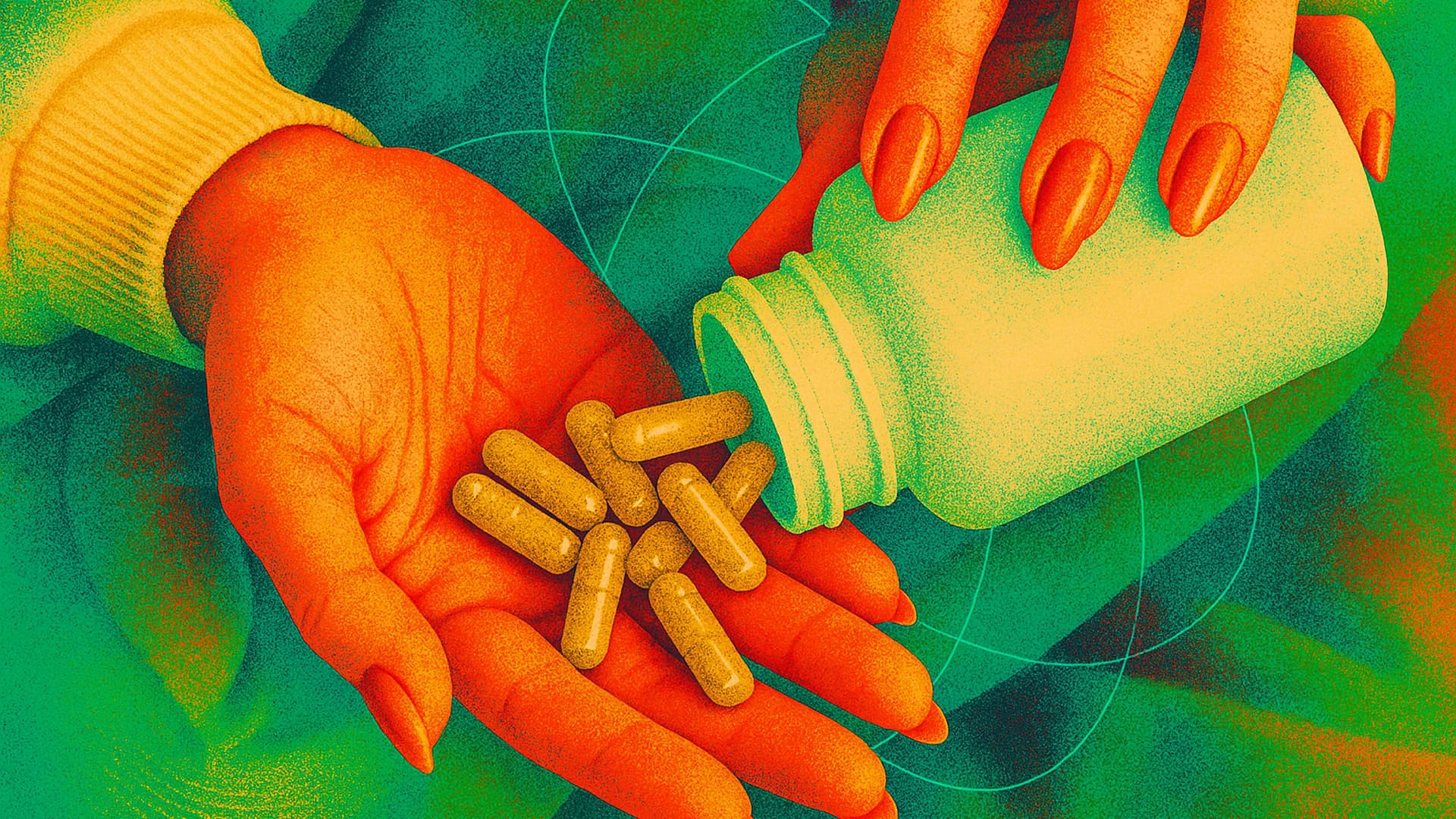
Who couldn’t use an extra boost of brain power now and then? Nootropics are “smart drugs”—both prescription meds and supplements—that might be able to do just that. Here’s everything you need to know about nootropics and how to use them wisely.
Like plenty of other working moms in their 40s, my brain doesn’t always feel as sharp as it used to. Some days (ok, many days), it feels impossible to stay focused and think clearly. Could my brain use a jumpstart now and then to get back on track? Yep. Absolutely.
Enter nootropics. Known as “smart drugs,” nootropics are a collection of compounds that improve cognition and brain function in various ways. The word “nootropic” is a combination of two Latin words that mean “to mind” and “to monitor.”
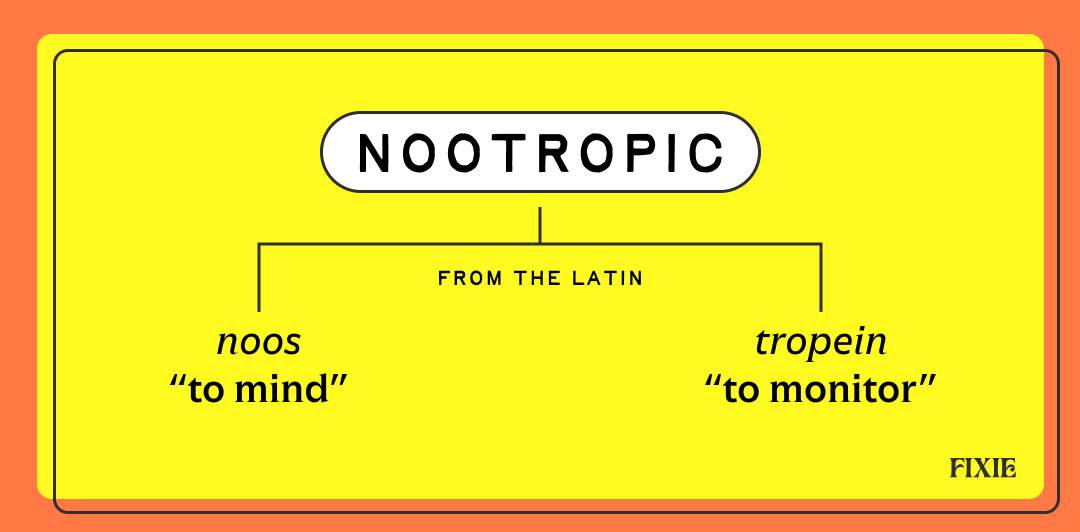
They’re broadly categorized into two groups: naturally occurring and synthetic. Most are plant-based natural substances, but others are prescription meds. Some are familiar (like caffeine and creatine), and others probably aren’t (like how-the-heck-do-you-pronounce phosphatidylserine and phenylpiracetam).
We’ll demystify nootropics and tell you everything you’ve ever needed to know about them: the different types, mechanisms, scientific evidence, safety concerns, and the best ways to use them.
Nootropics 101: Definitions & mechanisms
So, what are nootropics? By definition, they’re nontoxic, neuroprotective compounds and substances that improve cognition. Most are herbs or other natural substances, either packaged into supplements or found in food. Prescription nootropics are commonly used to treat dementia, Parkinson’s disease, ADHD, and schizophrenia.
Nootropics can activate memory, learning, focus, and other cognitive functions. Not all of them work the same way or provide the same benefits—and their exact mechanisms aren’t fully known—but here’s what we know about how some of them work.
“Many nootropics work in the brain by modulating neurotransmitters such as dopamine, GABA, acetylcholine, and norepinephrine, with the goal of improving the brain's energy metabolism and mitochondrial function,” explains registered dietitian nutritionist Trista Best, MPH, RDN, LD. These actions increase cerebral blood flow, which supports neuro- and synaptic plasticity.
Nootropics can improve oxygen and glucose supply in the brain and stimulate neuron growth by stimulating nerve growth factor (NGF) and brain-derived neurotrophic factor (BDNF).
“Some nootropics also work in the brain by a secondary means with their antioxidant and anti-inflammatory effects, which have neuroprotective benefits that improve long-term cognitive health and function,” Best says.
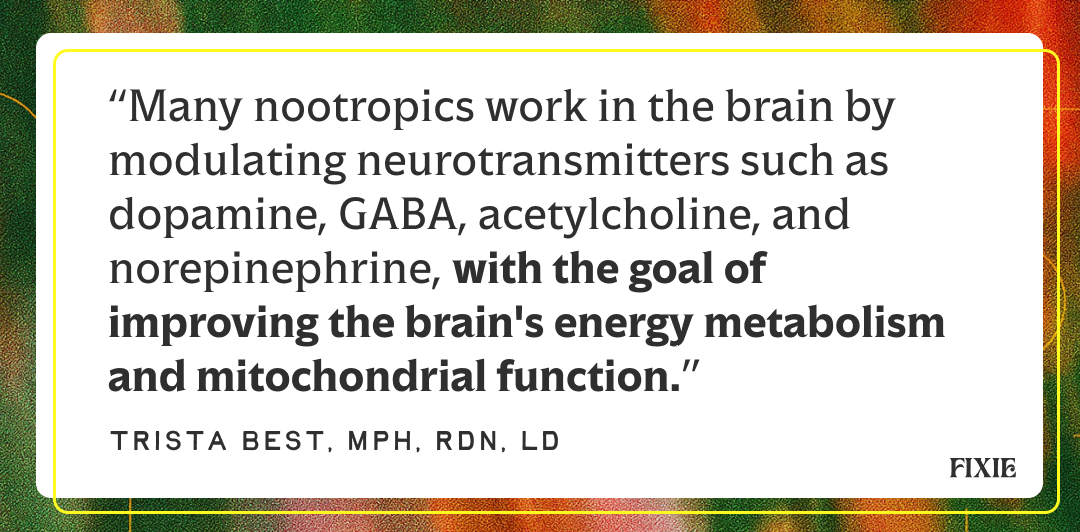
Types of nootropics
Like high school cliques, nootropics can be grouped into several different classifications, based on what they do and what they are.
Prescription cognitive enhancers:
- Central nervous system stimulants,used for ADHD and sleep disorders, including:
- Cholinesterase inhibitors, used for dementia and Alzheimer’s, including:
- donepezil (brand name Aricept)
- rivastigmine (brand name Exelon)
Over-the-counter stimulants:
- Caffeine
- L-theanine
Plant-based nootropics:
- Bacopa monnieri
- Rhodiola
- Ginkgo biloba
- Lion’s mane mushroom
- Saffron
- Panax ginseng
Nutrients and other natural compounds:
- Creatine
- Omega-3 fatty acids
- Phosphatidylserine
- L-tyrosine
- Citicoline
- Acetyl l-carnitine
Synthetics:
- Racetams
Do nootropics work?
There isn’t a straightforward yes or no answer, but they certainly can. Some nootropics have solid research that says they’re effective, others don’t. Many studies of nootropics have been done on mice, so their findings aren’t necessarily as bulletproof as they would be if they were done on humans.
Not only that, but there are also individual health and lifestyle factors that can impact how well nootropics work. These include our diet, activity level, existing health conditions, sleep quality, stress, and other medications or supplements we’re taking.
It also depends on your intended use and particular needs. Some nootropics are very effective at improving certain cognitive symptoms, but not others. One example: creatine has some solid support for its ability to support memory and focus over time, but it doesn’t appear to do much for alertness (bring on the coffee for that).
Here are a few standout nootropic supplements with solid scientific backing, according to Best: “For those wanting short-term mental alertness and performance, prescription stimulants and caffeine are supported the most with evidence, clinically and anecdotally. Long-term and preventative nootropics, including omega-3s, creatine, and herbal extracts like bacopa, have moderately supportive evidence.”
What are nootropics good for?
Nootropics are, by definition, substances that enhance your cognitive capabilities. But, not all nootropics work the same way or provide the same brain benefits. Depending on your specific need, there’s likely a nootropic that can help. And, you’re probably already using nootropics in some way, without even realizing it (no coffee, no workee).
Nootropics for attention and alertness
Caffeine
Speaking of coffee, I swear the smell of it brewing every morning soothes my soul. The jolt of alertness doesn’t hurt, either. Caffeine has been shown to improve mental alertness, attention, and executive function in the short-term, but side effects such as jitters, sleep disturbances, and cardiovascular effects can occur.
Guarana
Guarana is a nootropic herb that’s rich in caffeine and may help with memory. But it’s a stimulant, so it shouldn’t be taken by people with cardiovascular problems.
Lion’s mane
This functional mushroom has garnered lots of attention for its brain-boosting potential. “Small studies show this to be promising for nerve growth factor modulation and cognitive improvements,” Best says.
Modafinil and armodafinil
Modafinil (Provigil) and armodafinil (Nuvigil) are prescription stimulants that promote wakefulness. They’ve been FDA-approved for use in treating some sleep disorders and narcolepsy, but may be used off-label for things like pediatric ADHD and cancer-related fatigue. One word of warning: Modafinil and armodafinil are Schedule IV controlled substances because of their potential for abuse.
“They have been said to have a lower rate of addiction potential versus more well-known stimulants,” she adds. “They do have the potential to increase heart rate and blood pressure, especially when combined with other medications and stimulants.”
Methylphenidate and amphetamines
These prescription medications are FDA-approved for treating or managing ADHD and support focus. Adderall and Ritalin are well-known stimulants that are categorized as Schedule II controlled substances.“They have a higher risk of dependence and abuse along with leading to insomnia and potential appetite suppression,” Best says. “They have also been shown to increase risk of cardiovascular conditions when misused.”
Nootropics for anxiety, depression, and stress-related cognition
Ashwagandha
A literature review deemed ashwagandha to be effective for anxiety and social cognition. This is how we process and respond to information related to our social interactions with others. Its ability to help us chill out may come from increasing calming GABA.
L-theanine
The ultimate de-stress compound, l-theanine has potential benefits for memory, alertness, and attention while also having a calming effect. “When combined with caffeine, it can promote relaxation and lessen the jitters associated with caffeine while also improving attention,” Best says. L-theanine + a teeeeny bit of caffeine is one of the magical combos in Fixie Dust.
Saffron
Saffron isn’t just a spice. Those tiny (and expensive) threads from the crocus flower are most often used in cooking, but the spice could have some benefits for depression. Research found people who took saffron extract had less depression and better social relationships.
Omega-3 fatty acids
One of the most well-known supplements, omega-3 is promising for depression and anxiety. When paired with an antidepressant, omega-3 was found to be more effective for depression than antidepressants alone. EPA and DHA in particular are solid brain helpers. “They’re known to support brain structure, with modest evidence for mood and cognitive aging benefits, but high doses can increase bleeding risk,” Best says.
Phosphatidylserine
Phosphatidylserine is a naturally occurring structural component of the brain with antioxidant properties. When it’s dysregulated, it’s associated with neurodegenerative diseases and mental-health disorders. “It may help cognitive aging and stress responses in older adults,” Best says.
L-tyrosine
This compound is a nonessential amino acid that’s naturally produced in our bodies. It’s also found in aged cheeses—and in Fixie Dust. Tyrosine gets converted into dopamine and norepinephrine—both of which play important roles in memory, attention, and other cognitive functions. It has also been shown to offer a quick shot of focus and brain power in high-stress moments… which maybe explains why cheese is my go-to comfort food.
Acetyl l-carnitine (ALCAR)
Acetyl l-carnitine (ALCAR) is an amino acid the body can make by itself, found in red meat, dairy, nuts, and seeds… and Fixie Dust! It’s more easily absorbed than its close cousin carnitine and can pass through the blood-brain barrier. It has neuroprotective benefits and is important for energy production. Research has shown it may improve cognitive function in mild, early-stage Alzheimer’s.
Nootropics for memory
Bacopa monnieri
Also called brahmi, bacopa is a perennial plant used in Ayurvedic medicine. It offers calming effects and shows promise for memory, recall and anxiety-reduction. It’s often paired with other nootropic herbs. GI side effects are the most common. You need to take it consistently for weeks to months for real impact. Most studies done on bacopa are 12-week trials.
Panax ginseng
This adaptogenic herb has been used for centuries in Eastern medicine. Some research points to its effectiveness for memory and reaction time in middle-aged adults. Panax ginseng may also help fight fatigue. Research has found it impacts neurotransmitters and is effective at 200 mg a day for memory.
Creatine
Creatine seems to be the MVP of the supplement world at the moment. Most of what we hear about creatine has to do with muscle-building, but it may also have brain benefits. It’s naturally found in animal-based proteins. More research is needed, but so far it looks good for memory, processing speed, and attention.
But this supplement does come with a caveat: it takes about a month to boost your body’s creatine stores if you’re taking the recommended dose of 3-5 mg per day.
Citicoline (CDP-choline)
Citicoline might not be super-familiar, but it’s a brain-health powerhouse. This naturally occurring nootropic is great for memory and focus (which is why we put it in Fixie Dust!). Research also supports citicoline’s benefits for brain fog, attention, and mental clarity. It helps the brain repair itself, protects it from oxidative stress, and keeps the cells in the brain healthy.
Donepezil
Donepezil (known as the brand-name Aricept) is a prescription drug that’s FDA-approved for treating dementia in people with Alzheimer's disease. “It may improve cognitive function moderately, but this is not supported among the general population and can lead to GI issues and bradycardia (a slow heartbeat),” Best says.
Nootropics with mixed or limited evidence
Ginkgo biloba
Ginkgo is an antioxidant and can widen blood vessels. This may increase cerebral blood flow and tame inflammation, especially in people with neurodegenerative disorders. Some research suggests ginkgo can improve cognition and depression, but results are mixed. “It also carries a risk of bleeding, especially when used with anticoagulants,” Best says.
Rhodiola
Also known as arctic root, rhodiola grows in cold temperatures and has a long history of use in Scandinavia and Russia. It may reduce fatigue, work performance, and stress in the short term. The National Institutes of Health says it’s “possibly safe for up to 12 weeks.” It’s been used for a long time in various cultures, but it’s a little short on solid, high-quality research.
Racetams
Racetams are a class of synthetic drugs that share a common chemical structure. You’ll know them because they have “racetam” at the end of their names: piracetam, aniracetam, oxiracetam, phenylpiracetam, and levetiracetam. Evidence to their efficacy is limited and safety is a concern. “They’re used for cognitive enhancement, but evidence is mixed, though strong in clinical populations and healthy adults,” Best says. Only one racetam—levetiracetam (Keppra)—is FDA-approved (and that’s as an anti-epilepsy drug) and requires a prescription. Others, like piracetam, aren’t permitted by the FDA to be sold as supplements.
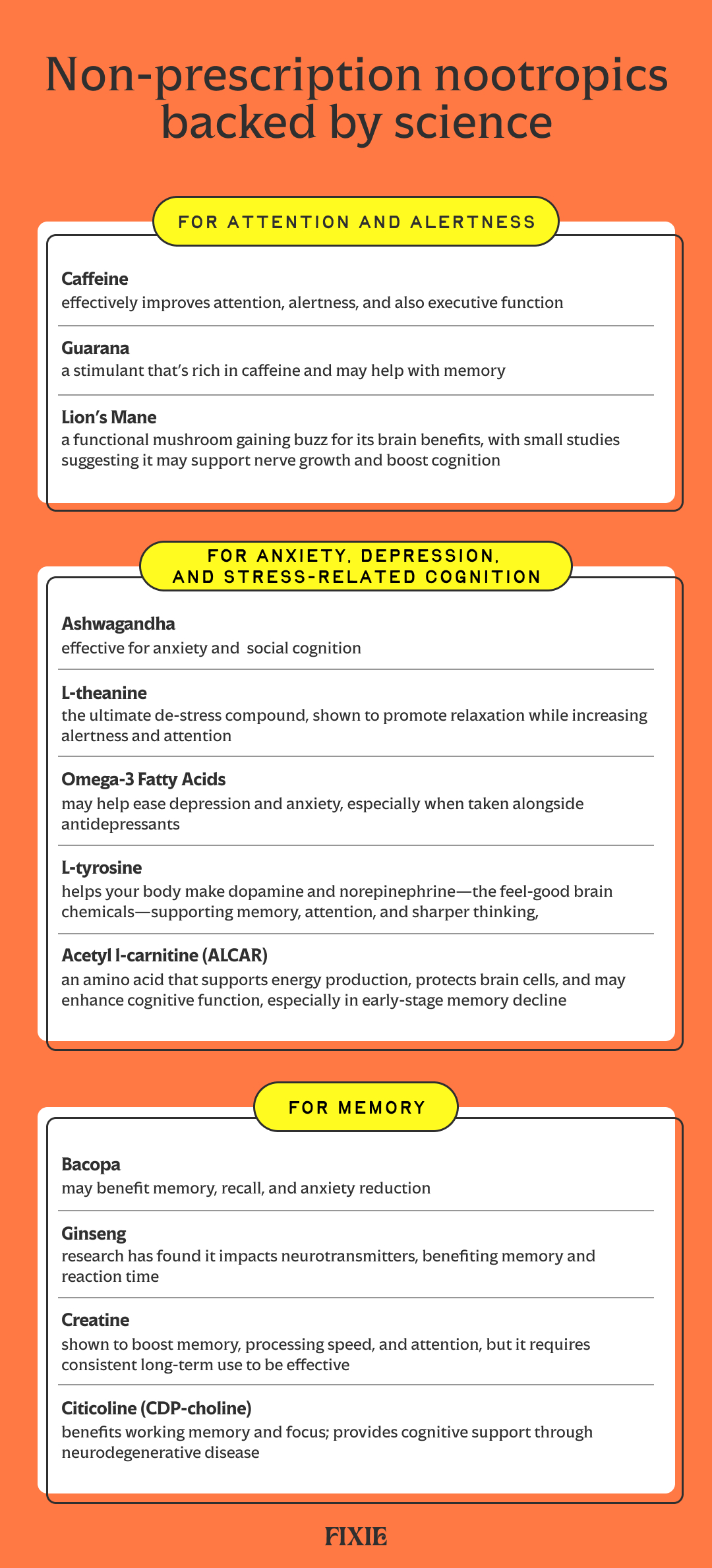
Potential benefits of nootropics
By now, you’ve probably figured out that “nootropics” is an umbrella term for lots of different substances that aren’t all the same. Yes, they all help the brain, but they do it in different ways.
Generally speaking, nootropics may improve mood, memory, attention, alertness, and processing speeds. They may help you feel less zonked and less stressed out.
Some are great for an in-the-moment boost if you’ve had a bad night of sleep or need some extra oomph to study or finish a project (looking at you, Fixie Dust). Other nootropics play a long game. They can help, but you’ll need to take them consistently for at least several weeks to experience the real effects (like creatine).
Best offers this rundown: “The most benefits include improved reaction time and alertness from caffeine and stimulants, better attention span and memory from stimulants and bacopa, improved mental fog and stress management from rhodiola and L-theanine, and overall mood from saffron and omega-3s.”
Nootropic side effects & risks
Again, nootropics are all different, and they’re generally considered to be safe. Any supplement or prescription medication has the potential to produce side effects. Some of the more common side effects are headaches and nausea. Also common are anxiety, insomnia, dizziness, and an elevated blood pressure or heart rate.
There are also potential for serious nootropic side effects, though these are far less common:
- dependence/tolerance (from stimulants and caffeine)
- mood swings, psychosis, or mania (especially from prescription stimulants)
- arrhythmias
- liver strain (from certain herbs, like ashwagandha)
- bleeding risk (ginkgo and high-dose omega-3’s)
- drug interactions (including rhodiola and SSRI antidepressants, and ginkgo and blood thinners)
Other risks are related to the quality of the product, especially supplements. These include contamination, adulteration, mislabeling, and the inclusion of undisclosed stimulants or other substances.
Due diligence is important: Check out the company first. Make sure the products undergo testing and meet strict quality standards, both by the manufacturer and by a third-party.
Are nootropics safe?
If used correctly, yes, though some are safer than others. But, nootropics are not a good choice for everyone. Children and teens should not take nootropics without the go-ahead from their pediatrician first. Get medical clearance from your doctor before taking a nootropic if you have any of the following conditions, Best urges:
- pregnancy or breastfeeding
- cardiovascular disease
- psychiatric disorders
- seizure disorders
- liver or kidney disease
- glaucoma
- uncontrolled thyroid disease
Nootropics can potentially interfere with other medications. Be sure to get the OK from your prescribing clinician first, especially if you’re taking these medications, Best says:
- antidepressants (SSRIs, SNRIs, MAOIs)
- blood thinners
- blood pressure medications
- diabetes medications
- sedatives
- prescription stimulants
Quality & buying guide
With roughly a billion supplement options available these days, it can be tricky to know which ones to buy. Before you plunk down your cash, here are some things to check out first:
- Pick products with clear, transparent labeling. You should know exactly what’s in them and in what amounts.
- Look on product labels or websites to see if they’ve been tested by these third-party groups for safety and quality control: USP, NSF, Informed Choice. An ISO lab certification shows the equipment in the company’s lab is calibrated and working properly. Also look for published certificates of analysis (CoAs).
- Anything that comes from the ground, like mushrooms and herbs, should undergo testing for heavy metals, pesticides, and microbes—many of which naturally hang out in or are added to soil. The Clean Label Project is a good resource.
- A little of something may be good, but that doesn’t mean a mega-dose is better. In fact, it could be dangerous. Avoid products with ingredients in crazy-high amounts.
- By law, supplements aren’t permitted to claim they prevent or treat specific diseases or disorders. Brands that do this are suspect.
How we chose the nootropics in Fixie Dust
Fixie Dust is a sweet-sour blend of brain-loving, science-backed nootropics to bring you a jolt of focus and energy in mere minutes. Here’s what inside every stick:
- L-theanine (vegan), 200 mg
- Citicoline (CDP-choline), 250 mg
- L-tyrosine (vegan), 500 mg
- Acetyl l-carnitine, 500 mg
- Extenergy® sustained-release Caffeine (from green coffee bean), 50 mg
“Fixie Dust was made for those foggy, can’t-think, mid-afternoon moments when coffee just doesn't cut it,” says Fixie Dust creator and founder Derek Flanzraich. “It’s a fast-acting, fun way to get calm, steady focus without the crash. (Pro tip: pour it under your tongue and you’ll feel it in about 5 minutes.)"
Legal & ethical considerations
A big warning: Using prescription medication (like an ADHD stimulant) that hasn’t been prescribed to you is illegal. It’s also illegal to share your own prescription meds with others. Some websites sell prescription ADHD meds online, but that’s also against the law.
If you’re an athlete, you should know some nootropics are banned by the World Anti-Doping Agency.
When to see a doctor
You should speak to your doctor before starting any nootropic supplements, especially if you take other medications or supplements or have existing health conditions.
If you’re experiencing brain fog that just won’t lift, seemingly endless fatigue, or ongoing sleep problems, talk to your doc. Definitely also see a healthcare professional if you’re experiencing depression or anxiety or any neurological symptoms.
The bottom line
Nootropics are naturally-occurring compounds or prescription medications that work as “smart drugs” for the brain, with benefits for memory, mood, focus, and alertness. Some nootropics are caffeine, creatine, ADHD medications, ginseng, ginkgo biloba, and lion’s mane, just to name a few.
Many nootropics are backed by solid scientific evidence, while others haven’t been researched as extensively. If you’re looking for a supplement to give you a boost—whether quick or sustained long-term— there are plenty of options out there. But as always when starting a supplement, talk it over with your medical provider first.
Fixie Dust is formulated with several cognition-charging nootropics, like l-theanine, caffeine, l-tyrosine, acetyl l-carnitine, and citicoline—chosen specifically for their scientific benefits. The supercharged sticks give your focus and memory a little leg up whenever you need it, making your midday slump a thing of the past.
Key takeaways
- Nootropics are prescription medications, herbs, or other supplements that have a positive effect on cognition, focus, memory, or alertness.
- Some of the most researched and effective nootropics include caffeine, creatine, omega-3 fatty acids, l-theanine, citicoline, and prescription stimulants.
- Nootropics are generally safe, but they have a risk of side effects, just like any other supplement.
- Talk to your physician before taking any nootropics, as they could interfere with other supplements and medications or may have an impact on other health conditions.
Frequently Asked Questions
There are lots of different types of nootropics, but the most well-known include caffeine, prescription stimulants to treat ADHD, creatine, and ashwagandha.
It depends on your particular brain goal. Nootropics perform different functions, work in various ways in the brain, and have varying degrees of effectiveness. Many nootropics have solid evidence backing them, including caffeine, creatine, and prescription medications.
No, nootropics are not illegal. Some are FDA-approved prescription medications. Others are over-the-counter supplements.
There’s no guarantee they’ll work for everyone, but prescription stimulants have solid clinical evidence that they can effectively treat and manage ADHD.
Nootropics may be able to improve memory, focus, attention, stress, fatigue, and mood. Some are used as treatments for brain-related disorders, like ADHD or dementia.
Nootropics in supplement form are not regulated by the FDA in the same way prescription and OTC drugs are. Many haven’t undergone rigorous clinical trials on humans to ensure they actually work and are safe to take.
Latest Posts
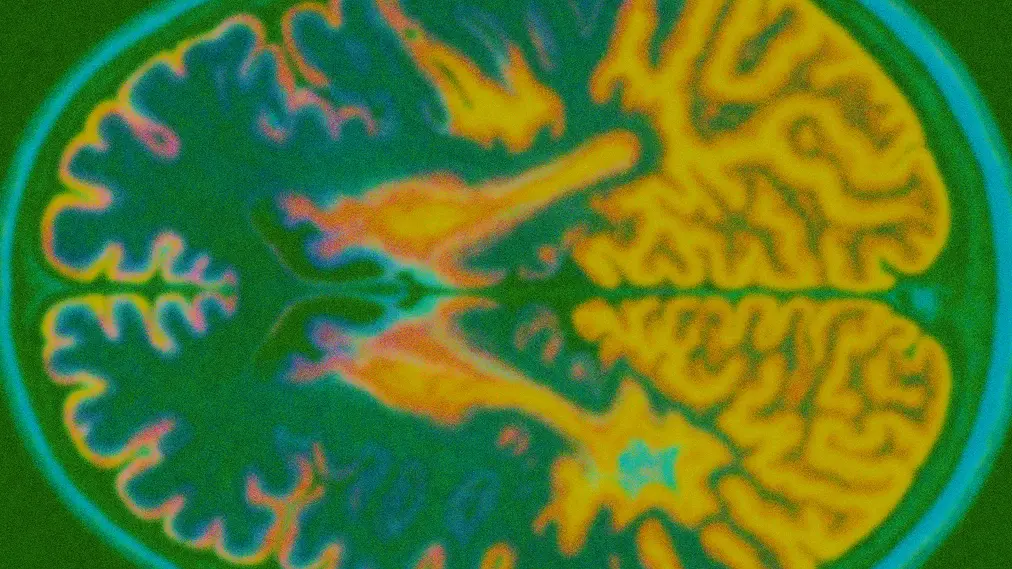






.svg)

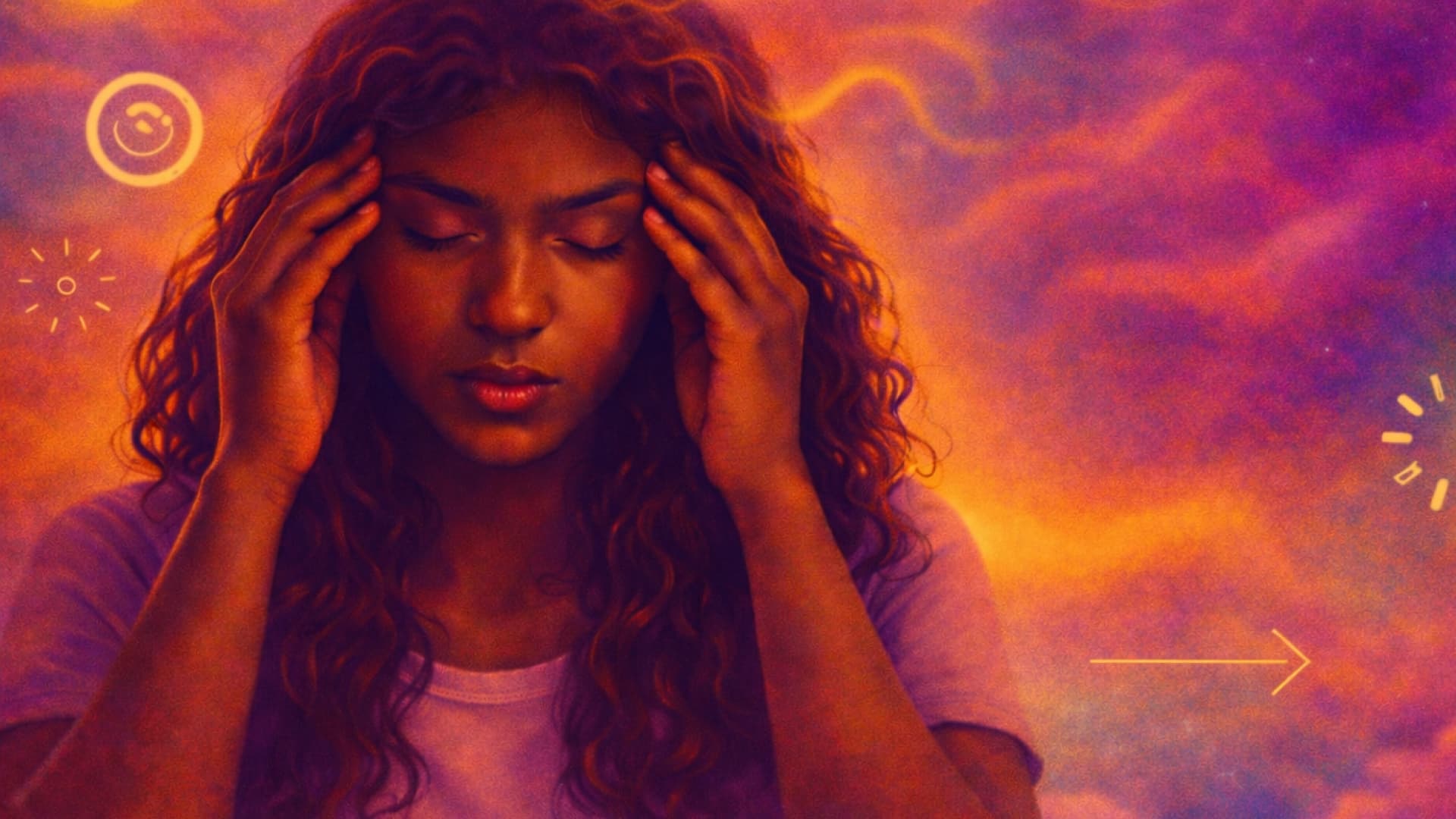
.jpg)
